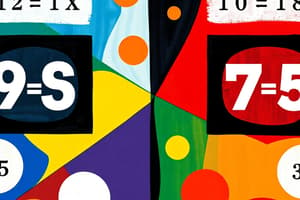Podcast
Questions and Answers
What is the condition for a number to be divisible by 3?
What is the condition for a number to be divisible by 3?
- The sum of its digits is divisible by 3 (correct)
- The last digit is 0 or 5
- The sum of its digits is an even number
- The number is a prime number
What is the condition for a number to be divisible by 9?
What is the condition for a number to be divisible by 9?
- The sum of its digits is an even number
- The last digit is 0 or 9
- The sum of its digits is divisible by 9 or the remainder when divided by 9 is 0 (correct)
- The number is a prime number
What is the condition for a number to be divisible by 6?
What is the condition for a number to be divisible by 6?
- The number is even and the sum of its digits is divisible by 3 (correct)
- The sum of its digits is divisible by 2
- The number is a multiple of 3
- The last digit is 0 or 2
If a number is divisible by 3 and 2, what else can be concluded?
If a number is divisible by 3 and 2, what else can be concluded?
What is a common real-world application of divisibility rules?
What is a common real-world application of divisibility rules?
If a number is divisible by 9, what else can be concluded?
If a number is divisible by 9, what else can be concluded?
What is the purpose of using divisibility rules?
What is the purpose of using divisibility rules?
Flashcards are hidden until you start studying
Study Notes
Divisibility Rules
Divisibility By 3 With Sum Of Digits
- A number is divisible by 3 if the sum of its digits is also divisible by 3.
- Example: 123 is divisible by 3 because 1 + 2 + 3 = 6, which is divisible by 3.
Divisibility By 6 With Even Number And Sum Of Digits
- A number is divisible by 6 if it is even (last digit is 0, 2, 4, 6, or 8) and the sum of its digits is divisible by 3.
- Example: 120 is divisible by 6 because it is even (last digit is 0) and 1 + 2 + 0 = 3, which is divisible by 3.
Divisibility By 9 With Sum Of Digits And Remainder
- A number is divisible by 9 if the sum of its digits is divisible by 9 or if the remainder when divided by 9 is 0.
- Example: 459 is divisible by 9 because 4 + 5 + 9 = 18, which is divisible by 9.
Relationship Between Divisibility Rules
- If a number is divisible by 3 and 2, it is also divisible by 6.
- If a number is divisible by 9, it is also divisible by 3.
Applying Divisibility Rules To Real-world Problems
- Divisibility rules can be used to quickly check if a number is divisible by a certain number without having to perform the actual division.
- Examples: checking if a number is divisible by 3 or 6 when splitting a group of people into teams, or checking if a number is divisible by 9 when calculating the total cost of items.
Prime Factors
- A prime factor is a prime number that divides a given number exactly without leaving a remainder.
- Example: the prime factors of 12 are 2, 2, and 3 because 2 × 2 × 3 = 12.
- Prime factors are used to find the greatest common divisor (GCD) and least common multiple (LCM) of two or more numbers.
Divisibility Rules
Divisibility by 3
- A number is divisible by 3 if the sum of its digits is also divisible by 3.
- This rule can be applied to any number, regardless of its size.
Divisibility by 6
- A number is divisible by 6 if it is even (last digit is 0, 2, 4, 6, or 8) and the sum of its digits is divisible by 3.
- This rule combines two conditions: even number and sum of digits being divisible by 3.
Divisibility by 9
- A number is divisible by 9 if the sum of its digits is divisible by 9 or if the remainder when divided by 9 is 0.
- This rule provides two alternative ways to check for divisibility by 9.
Relationships Between Divisibility Rules
- If a number is divisible by 3 and 2, it is also divisible by 6.
- If a number is divisible by 9, it is also divisible by 3.
- These relationships can be used to simplify divisibility checks.
Applications of Divisibility Rules
- Divisibility rules can be used to quickly check if a number is divisible by a certain number without performing actual division.
- Examples include checking divisibility by 3 or 6 when splitting a group into teams, or checking divisibility by 9 when calculating the total cost of items.
Prime Factors
- A prime factor is a prime number that divides a given number exactly without leaving a remainder.
- Prime factors are used to find the greatest common divisor (GCD) and least common multiple (LCM) of two or more numbers.
- Example: the prime factors of 12 are 2, 2, and 3, as 2 × 2 × 3 = 12.
Studying That Suits You
Use AI to generate personalized quizzes and flashcards to suit your learning preferences.




